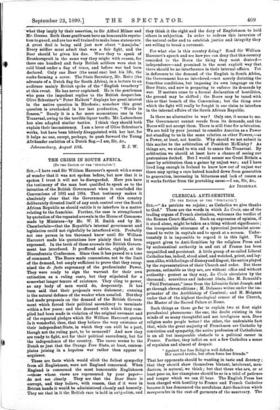TELE CRISIS IN SOUTH AFRICA.
[TO THE EDITOR OF THE "SPECTATOR."]
SIR,—I have read Sir William Harcourt's speech with a sense of wonder that it was not spoken before, but now that it is spoken I trust it will not be disregarded. Here you have the testimony of the man beat qualified to speak as to the intention of the British Government when it concluded the Conventions of 1881 and 1884. That testimony makes it absolutely clear that the Government of this country deliberately divested itself of any such control over the South African Republic as should entitle it to interfere in a matter relating to the franchise. Further, the case is strengthened by quotation of the repeated avowals in the House of Commons made by Ministers—by Mr. W. H. Smith and by Mr. Chamberlain—that the Republic's internal government and legislation could not rightfully be interfered with. Probably not one person in ten thousand knew' until Sir William Harcourt made his quotations how plainly that had been expressed. In the teeth of those avowals the British Govern. ment has interfered. It proffered advice, rightly, at the Bloemfontein Conference. Since then it has passed to a tone of command. The Boers made concessions, not to the limit of the demand, but amply sufficient to prove that they recog- nised the de facto supremacy of the predominalt Power. They were ready to sign the warrant for their own extinction as a ruling caste, but they stipulated for a somewhat longer tenure of existence. They cling to power, as any body of men would do, desperately. It has been said that their proposals were dishonest; cunning is the natural defence of the weaker when assailed. But they had made proposals on the demand of the British Govern- ment which forced their political ascendency to terminate within a few years: and the demand with which they com- plied had been made in violation of the original covenant and of the repeated pledges which Sir William Harcourt quotes. Is it wonderful, then, that they believe the very existence of their independent State, in which they can still be a part, though not the ruling part, to be menaced? And now they are ready to fight, not for their political ascendency, but for the independence of the country. The cause seems to the Dutch so just that the Orange Free State, at least, contem- plates joining in a hopeless war rather than appear to acquiesce.
These are facts which would elicit the fullest sympathy from all Englishmen, were not England concerned. When England is concerned the most honourable Englishmen —those whose views are represented by your paper— do not see clearly. They see that the Boer State is corrupt, and they believe, with reason, that if it were in British hands it would be administered cleanly and honestly. They see that in it the British race is held in subjection, and
they think it the right and the duty of Englishmen to hold others in subjection. In order to redress this inversion of the natural order and to establish justice and integrity they are willing to break a covenant.
For what else is this country doing ? Read Sir William Harcourt's speech and see how you can deny that this country conceded to the Boers the thing they most desired- independence—and promised in the most explicit way that there should be no interference in their internal affairs. Yet in deference to the demand of the English in South Africa, the Government has so interfered,—not merely dictating the franchise conditions, but imposing its own language on the Boer State, and now is preparing to enforce its demands by war. If matters come to a formal declaration of hostilities, the ground may be shifted ; the Boers may be taxed with this or that breach of the Convention ; but the thing over which the fight will really be fought is our claim to interfere in the internal affairs of the South African Republic.
Is there no alternative to war ? Only one, it seems to me. The Government cannot recede from its demands, and the Boers will not accept them. There is still time for arbitration. We are told by your journal to consider America as a Power not standing to us in the same relation as other Powers,—as a Power, at least, not hostile. Why should we not submit in this matter to the arbitration of President McKinley ? As things are, we stand to win and to annex the Transvaal. By arbitration we should at least have a chance of seeing our pretensions docked. But I would sooner see Great Britain a loser by arbitration than a gainer by unjust war ; and I have lived long enough in Ireland to know how out of unjust war there may spring a race hatred handed down from generation to generation, increasing in bitterness and lack of reason as it works further from the provoking cause.—I am, Sir, &o.,
AN IRISHMAN.


































 Previous page
Previous page